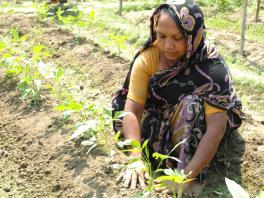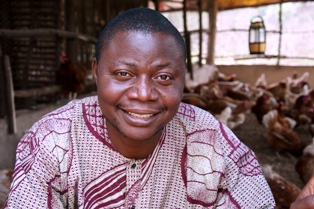 This year’s Earth Day theme is The Face of Climate Change. Conversations about the environment and climate change are often accompanied by images of inclement weather, melting ice caps and barren fields. But what we don’t see often are the faces of individuals for whom climate change is more than a talking point – it is a harsh, everyday reality that limits access to food, income and prosperity. Climate change diminishes crop quality and value, increases the food access disparity and perpetuates the larger cycle of malnutrition for millions of people.
This year’s Earth Day theme is The Face of Climate Change. Conversations about the environment and climate change are often accompanied by images of inclement weather, melting ice caps and barren fields. But what we don’t see often are the faces of individuals for whom climate change is more than a talking point – it is a harsh, everyday reality that limits access to food, income and prosperity. Climate change diminishes crop quality and value, increases the food access disparity and perpetuates the larger cycle of malnutrition for millions of people.
Around the world, extreme weather patterns are turning dry seasons into droughts and rainy seasons into floods. For those on the front lines of hunger, these climate changes make each and every year harder than the last, diverting valuable energy that could otherwise be used to improve education, fight for women’s rights, build clean water sources and elevate entire communities out of hunger and poverty.
At the core of The Hunger Project’s work is the knowledge that when women are given equal access to resources, rights and opportunities, families, communities and entire nations improve in health and well-being. Over the years, it has been proven that this core principle is vital in the discussion of the environment since women farmers are the hardest hit by climate change. Women comprise 70% of the world’s agricultural force – they plant, harvest, transport, sell and cook the food necessary for survival. And yet 60% of the world’s hungry are women. Without the rights to their lands or profits, women in agriculture are already at a disadvantage. The challenges presented by a changing climate exacerbate the disadvantage and contribute to decreased resources for everyone.
This Earth Day, we want you to meet these people – the people far removed from the political discussion around climate change. These women and men are practicing responsible agricultural techniques, prioritizing their environment and teaching their communities to do the same. Won’t you join them?
 Meet Bienvenu Ijeme. He and his wife Justine Azangbe live in the village of Dovi in Benin where they raise chickens, turkeys and rabbits. “With the loans of THP’s bank I can buy more poultry, as well as the necessary feed for them. I already knew quite a bit about poultry farming, but the workshops at the Zakpota Epicenter added to my knowledge. This way I now know even better what my animals need to stay in good health.”
Meet Bienvenu Ijeme. He and his wife Justine Azangbe live in the village of Dovi in Benin where they raise chickens, turkeys and rabbits. “With the loans of THP’s bank I can buy more poultry, as well as the necessary feed for them. I already knew quite a bit about poultry farming, but the workshops at the Zakpota Epicenter added to my knowledge. This way I now know even better what my animals need to stay in good health.”
The lives of Bienvenu, his wive and his children are inextricably linked to the health of his animals, the cost and quality of locally-grown grains and to the environment in Benin. Bienvenu is the face of climate change.
Meet Alhakatu Umaru from Ghana. She was once reliant on petty trading to buy small amounts of food, leaving her with little in savings and making it dificult to send her children to school. After joining The Hunger Project’s microfinance program and agricultural trainings, Alhakatu began her own maize and cassava farming. She now grows nearly all the food her family needs and uses profit from her crop sales to build a better life for her and her family.
Alhakatu is the face of climate change.
What We Do
People living in conditions of chronic hunger and extreme poverty in the developing world are primarily food farmers, and their well-being is most closely tied to the natural environment. THP’s programs:
- Promote sustainable farming practices such as composting, intercropping, and drip irrigation;
- Increase access to sustainable agricultural technology;
- Raise awareness of and build capacity to adapt to climate change;
- Facilitate reforestation through tree planting campaigns and the establishment of tree nurseries; and
- Empower village leaders to begin recycling programs in their communities.
Links
- Invest now in THP’s work to call forth a sustainable end to chronic hunger and extreme poverty on our planet.
- Find out more about how our Hunger Project partners work to end their own hunger while protecting their natural environment.
